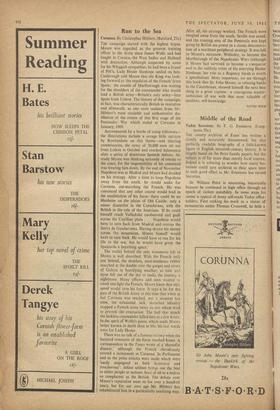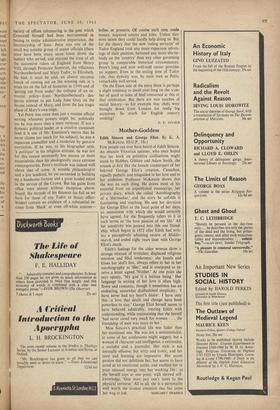Middle of the Road
Tudor Secretary. By F. G. Emmison. (Long- mans, 50s.) THE county archivist of Essex has written a closely and accurately documented, but aka perfectly readable biography of a little-known figure in English sixteenth-century history. It largely based on the Petre family papers, but the subject is of far more than merely local intere,t. Indeed it is sobering to wonder how many his- torians could turn archivist in their spare time to such good effect as Mr. Emmison has turned historian.
Sir William Petre is interesting historically because he continued in high office through an epoch of violent instability. In some ways his career is typical of many self-made Tudor office- holders. First making his mark as a visitor of monasteries under Thomas Cromwell, he held a
variety of offices culminating in the post which Cromwell himself had been instrumental in raising to major administrative importance, the Secretaryship of State. Petre was one of the small but notable group of senior officials (there must have been many more lower down the ladder) who served, and enjoyed the trust of all the successive rulers of England from Henry VIII, through Protector Somerset, the villainous Northumberland and Mary Tudor, to Elizabeth. He had, it must be said, an almost uncanny knack of coming out on the winning side in a crisis (as on the fall of Somerset in 1549) and of 'getting out from under' the collapse of an ex- tremist policy—from Northumberland's des- perate attempt to put Lady Jane Grey on the throne instead of Mary, and from the last tragic phase of Mary's own reign.
Yet Petre was more than just a routine official serving whatever powers might be; politically too he was more than a mere turncoat. If not a dynamic political leader or a creative statesman (and it is one of Mr. Emmison's merits that he never claims too much for his subject), he was a sagacious councillor and a moderate by genuine conviction. If he was, as his biographer says, 'a politique in his religious attitude, he was not for this reason necessarily less sincere or more materialistic than his ideologically more extreme contemporaries. Petre's rectitude was indeed well above that of some. A notable philanthropist and a just landlord, he yet succeeded in building up a handsome fortune and a great landed estate in the service of the Crown. But his gains from office were almost without exception above- board; the records of his finances (as full as we have for those of any Tudor or Stuart office- holder) contain no evidence of a substantial in- come from 'black' or even off-white sources— bribes or presents. Of course such men made money, acquired estates and titles. Unless they were saints they could hardly help doing so. But for the theory that the new 'ruling servants' of Tudor England took any more rapacious advan- tage of their position, battened any more shame- lessly on the 'country' than any other governing group in comparable historical circumstances. Petre's long and now well-told career provides no support. Even in the testing time of Tudor rule, that dynasty was, by such men as Petre, remarkably well served.
On the Essex side of the story there is perhaps a slight tendency to dwell over-long on the num- ber of quail or sides of beef consumed at this or that celebration. But there are nice touches of social history—as for example that chefs were brought down from London for really big occasions. So much for English country cooking I
G. E. AYLMER



































 Previous page
Previous page